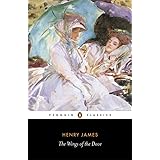
Download the free Kindle app and start reading Kindle books instantly on your smartphone, tablet, or computer - no Kindle device required.
Read instantly on your browser with Kindle for Web.
Using your mobile phone camera - scan the code below and download the Kindle app.

OK
 Audible sample Sample
Audible sample Sample 


Daisy Miller Paperback – January 1, 2005
- Print length80 pages
- LanguageEnglish
- PublisherDigireads.Com
- Publication dateJanuary 1, 2005
- Dimensions5 x 0.5 x 8.25 inches
- ISBN-101420925172
- ISBN-13978-1420925173
Books with Buzz
Discover the latest buzz-worthy books, from mysteries and romance to humor and nonfiction. Explore more
Similar items that may deliver to you quickly
Editorial Reviews
Excerpt. © Reprinted by permission. All rights reserved.
Daisy Miller
By Henry JamesDigireads.com
Copyright © 2005 Henry JamesAll right reserved.
ISBN: 9781420925173
Chapter I
At the little town of Vevey, in Switzerland, there is a particularly comfortable hotel; there are indeed many hotels, since the entertainment of tourists is the business of the place, which, as many travellers will remember, is seated upon the edge of a remarkably blue lake —a lake that it behoves every tourist to visit. The shore of the lake presents an unbroken array of establishments of this order, of every category, from the “grand hotel” of the newest fashion, with a chalk-white front, a hundred balconies, and a dozen flags flying from its roof, to the small Swiss pension of an elder day, with its name inscribed in German-looking lettering upon a pink or yellow wall and an awkward summer-house in the angle of the garden. One of the hotels at Vevey, however, is famous, even classical, being distinguished from many of its upstart neighbours by an air both of luxury and of maturity. In this region, through the month of June, American travellers are extremely numerous; it may be said indeed that Vevey assumes at that time some of the characteristics of an American watering-place. There are sights and sounds that evoke a vision, an echo, of Newport and Saratoga. There is a flitting hither and thither of “stylish” young girls, a rustling of muslin flounces, a rattle of dance-music in the morning hours, a sound of high-pitched voices at all times. You receive an impression of these things at the excellent inn of the “Trois Couronnes,” and are transported in fancy to the Ocean House or to Congress Hall. But at the “Trois Couronnes,” it must be added, there are other features much at variance with these suggestions: neat German waiters who look like secretaries of legation; Russian princesses sitting in the garden; little Polish boys walking about, held by the hand, with their governors; a view of the snowy crest of the Dent du Midi and the picturesque towers of the Castle of Chillon.
I hardly know whether it was the analogies or the differences that were uppermost in the mind of a young American, who, two or three years ago, sat in the garden of the “Trois Couronnes,” looking about him rather idly at some of the graceful objects I have mentioned. It was a beautiful summer morning, and in whatever fashion the young American looked at things they must have seemed to him charming. He had come from Geneva the day before, by the little steamer, to see his aunt, who was staying at the hotel—Geneva having been for a long time his place of residence. But his aunt had a headache—his aunt had almost always a headache—and she was now shut up in her room smelling camphor, so that he was at liberty to wander about. He was some seven-and-twenty years of age; when his friends spoke of him they usually said that he was at Geneva “studying.” When his enemies spoke of him they said—but after all he had no enemies: he was extremely amiable and generally liked. What I should say is simply that when certain persons spoke of him they conveyed that the reason of his spending so much time at Geneva was that he was extremely devoted to a lady who lived there—a foreign lady, a person older than himself. Very few Americans—truly I think none—had ever seen this lady, about whom there were some singular stories. But Winterbourne had an old attachment for the little capital of Calvinism; he had been put to school there as a boy and had afterwards even gone, on trial—trial of the grey old “Academy” on the steep and stony hillside—to college there; circumstances which had led to his forming a great many youthful friendships. Many of these he had kept, and they were a source of great satisfaction to him.
After knocking at his aunt’s door and learning that she was indisposed he had taken a walk about the town and then he had come in to his breakfast. He had now finished that repast, but was enjoying a small cup of coffee which had been served him on a little table in the garden by one of the waiters who looked like attachés. At last he finished his coffee and lit a cigarette. Presently a small boy came walking along the path—an urchin of nine or ten. The child, who was diminutive for his years, had an aged expression of countenance, a pale complexion and sharp little features. He was dressed in knickerbockers and had red stockings that displayed his poor little spindle-shanks; he also wore a brilliant red cravat. He carried in his hand a long alpenstock, the sharp point of which he thrust into everything he approached—the flower-beds, the garden-benches, the trains of the ladies’ dresses. In front of Winterbourne he paused, looking at him with a pair of bright and penetrating little eyes.
“Will you give me a lump of sugar?” he asked in a small sharp hard voice—a voice immature and yet somehow not young.
Winterbourne glanced at the light table near him, on which his coffee-service rested, and saw that several morsels of sugar remained. “Yes, you may take one,” he answered; “but I don’t think too much sugar good for little boys.”
This little boy stepped forward and carefully selected three of the coveted fragments, two of which he buried in the pocket of his knickerbockers, depositing the other as promptly in another place. He poked his alpenstock, lance-fashion, into Winterbourne’s bench and tried to crack the lump of sugar with his teeth.
“Oh blazes; it’s har-r-d!” he exclaimed, divesting vowel and consonants, pertinently enough, of any taint of softness.
Winterbourne had immediately gathered that he might have the honour of claiming him as a countryman. “Take care you don’t hurt your teeth,” he said paternally.
“I haven’t got any teeth to hurt. They’ve all come out. I’ve only got seven teeth. Mother counted them last night, and one came out right afterwards. She said she’d slap me if any more came out. I can’t help it. It’s this old Europe. It’s the climate that makes them come out. In America they didn’t come out. It’s these hotels.”
Winterbourne was much amused. “If you eat three lumps of sugar your mother will certainly slap you,” he ventured.
“She’s got to give me some candy then,” rejoined his young interlocutor. “I can’t get any candy here—any American candy. American candy’s the best candy.”
“And are American little boys the best little boys?” Winterbourne asked.
“I don’t know. I’m an American boy,” said the child.
“I see you’re one of the best!” the young man laughed.
“Are you an American man?” pursued this vivacious infant. And then on his friend’s affirmative reply, “American men are the best,” he declared with assurance.
His companion thanked him for the compliment, and the child, who had now got astride of his alpenstock, stood looking about him while he attacked another lump of sugar. Winterbourne wondered if he himself had been like this in his infancy, for he had been brought to Europe at about the same age.
“Here comes my sister!” cried his young compatriot. “She’s an American girl, you bet!”
Winterbourne looked along the path and saw a beautiful young lady advancing. “American girls are the best girls,” he thereupon cheerfully remarked to his visitor.
“My sister ain’t the best!” the child promptly returned. “She’s always blowing at me.”
“I imagine that’s your fault, not hers,” said Winterbourne. The young lady meanwhile had drawn near. She was dressed in white muslin, with a hundred frills and flounces and knots of pale-coloured ribbon. Bareheaded, she balanced in her hand a large parasol with a deep border of embroidery; and she was strikingly, admirably pretty. “How pretty they are!” thought our friend, who straightened himself in his seat as if he were ready to rise.
The young lady paused in front of his bench, near the parapet of the garden, which overlooked the lake. The small boy had now converted his alpenstock into a vaulting-pole, by the aid of which he was springing about in the gravel and kicking it up not a little. “Why Randolph,” she freely began, “what are you doing?”
“I’m going up the Alps!” cried Randolph. “This is the way!” And he gave another extravagant jump, scattering the pebbles about Winterbourne’s ears.
“That’s the way they come down,” said Winterbourne.
“He’s an American man!” proclaimed Randolph in his harsh little voice.
The young lady gave no heed to this circumstance, but looked straight at her brother. “Well, I guess you’d better be quiet,” she simply observed.
It seemed to Winterbourne that he had been in a manner presented. He got up and stepped slowly toward the charming creature, throwing away his cigarette. “This little boy and I have made acquaintance,” he said with great civility. In Geneva, as he had been perfectly aware, a young man wasn’t at liberty to speak to a young unmarried lady save under certain rarely-occurring conditions; but here at Vevey what conditions could be better than these?—a pretty American girl coming to stand in front of you in a garden with all the confidence in life. This pretty American girl, whatever that might prove, on hearing Winterbourne’s observation simply glanced at him; she then turned her head and looked over the parapet, at the lake and the opposite mountains. He wondered whether he had gone too far, but decided that he must gallantly advance rather than retreat. While he was thinking of something else to say the young lady turned again to the little boy, whom she addressed quite as if they were alone together. “I should like to know where you got that pole.”
“I bought it!” Randolph shouted.
“You don’t mean to say you’re going to take it to Italy!”
“Yes, I’m going to take it t’ Italy!” the child rang out.
She glanced over the front of her dress and smoothed out a knot or two of ribbon. Then she gave her sweet eyes to the prospect again. “Well, I guess you’d better leave it somewhere,” she dropped after a moment.
“Are you going to Italy?” Winterbourne now decided very respectfully to enquire.
She glanced at him with lovely remoteness. “Yes, sir,” she then replied. And she said nothing more.
“And are you—a—thinking of the Simplon?” he pursued with a slight drop of assurance.
“I don’t know,” she said. “I suppose it’s some mountain. Randolph, what mountain are we thinking of?”
Continues...
Excerpted from Daisy Millerby Henry James Copyright © 2005 by Henry James. Excerpted by permission.
All rights reserved. No part of this excerpt may be reproduced or reprinted without permission in writing from the publisher.
Excerpts are provided by Dial-A-Book Inc. solely for the personal use of visitors to this web site.
Product details
- Publisher : Digireads.Com (January 1, 2005)
- Language : English
- Paperback : 80 pages
- ISBN-10 : 1420925172
- ISBN-13 : 978-1420925173
- Item Weight : 3.35 ounces
- Dimensions : 5 x 0.5 x 8.25 inches
- Best Sellers Rank: #2,050,921 in Books (See Top 100 in Books)
- #41,802 in Classic Literature & Fiction
- Customer Reviews:
About the author

Henry James (1843-1916), the son of the religious philosopher Henry James Sr. and brother of the psychologist and philosopher William James, published many important novels including Daisy Miller, The Wings of the Dove, The Golden Bowl, and The Ambassadors.
Customer reviews
Customer Reviews, including Product Star Ratings help customers to learn more about the product and decide whether it is the right product for them.
To calculate the overall star rating and percentage breakdown by star, we don’t use a simple average. Instead, our system considers things like how recent a review is and if the reviewer bought the item on Amazon. It also analyzed reviews to verify trustworthiness.
Learn more how customers reviews work on Amazon-
Top reviews
Top reviews from the United States
There was a problem filtering reviews right now. Please try again later.
Note: I am uncredentialed in regard to a formal education in literature.
Towards the end of the nineteenth century there was the beginning of an evolution of literature as well as other arts into an era known as Modernism. I think this novella is early modernist. There is symbolism. Daisy is the title character. Her name evokes the image of a pretty spring flower. She has a friend Winterbourne, also symbolic I believe. He is more conservative. They are both Americans visiting Europe. There are issues about different cultures. These differences may include emerging feminist issues, and their differ within the various cultures.
While I personally prefer the voice of women authors describing to me the nuances of feminist issues, I am always interested in hearing a male attempt to give voice to such issues. Therefore the opportunity to read what I believe is one an early modernist novella, by a then newly emerging American author, giving voice to changing and sometimes clashing social issues, including feminist social issues, is what intrigues me about this novella.
I prefer an eclectic mixture of reading. This is not a novella I would choose for light entertainment. I enjoy this novella more for study purposes. It is all in what one is looking for. Thank You for taking the time to read this review.
Top reviews from other countries
Aber, Daisy Miller sieht in ihm einen Reisegefährten, einen Freund und widersetzt sich der Gesellschaft. Es gibt zwar einen jungen Amerikaner, der ihr wenigstens zum Teil hilft, aber seine Liebe (oder, was er darunter versteht) ist nicht gross genug.
Daisy eilt durch Länder und Städten Europa, möchte nicht das "Übliche" sehen. Sie will leben, leben...Rom mit seinem Charme hat sie angesteckt.
Im doppelten Sinne. Sie will die einfachen Leute kennenlernen, sie möchte frei sein.
Die Gesellschaft, die noch steifer ist als zuhause (man muss ja ALTE WERTE verteidigen) will nichts mit ihr zu tun haben. Möchte Daisy in so einer Gesellschaft leben?
H. James setzt mit JEDEM Wort eine Homage an eine sehr mutige junge Frau. Und das im Jahre 1879!
Die Erzählung berührt mich noch nach mehr als 30 Jahren tief. Jedesmal. Bitte, lesen!













